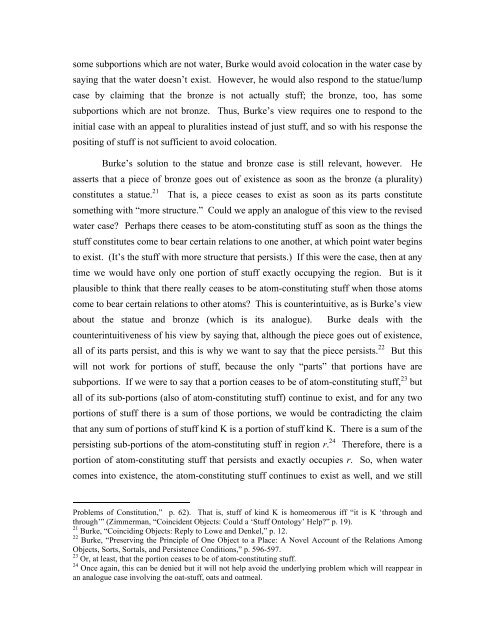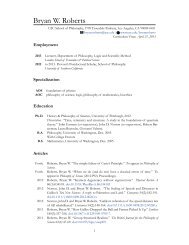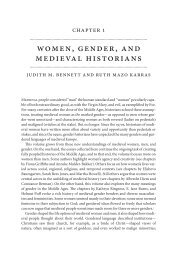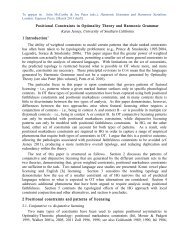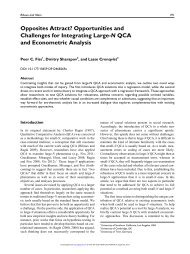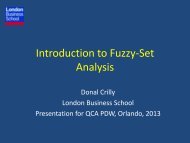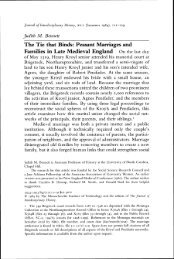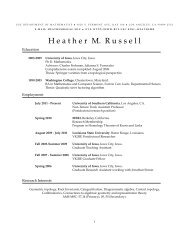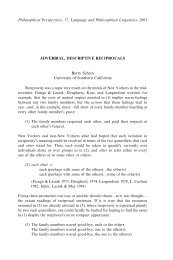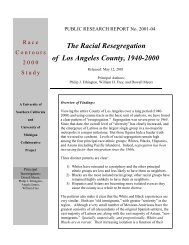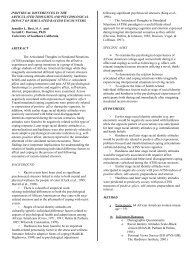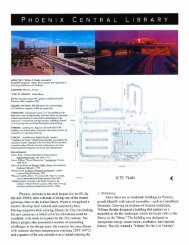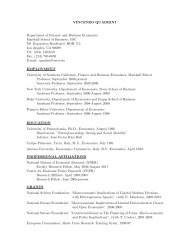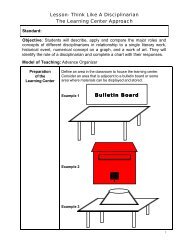Shieva Kleinschmidt [This version differs from the Phil Studies ... - Usc
Shieva Kleinschmidt [This version differs from the Phil Studies ... - Usc
Shieva Kleinschmidt [This version differs from the Phil Studies ... - Usc
You also want an ePaper? Increase the reach of your titles
YUMPU automatically turns print PDFs into web optimized ePapers that Google loves.
some subportions which are not water, Burke would avoid colocation in <strong>the</strong> water case by<br />
saying that <strong>the</strong> water doesn’t exist. However, he would also respond to <strong>the</strong> statue/lump<br />
case by claiming that <strong>the</strong> bronze is not actually stuff; <strong>the</strong> bronze, too, has some<br />
subportions which are not bronze. Thus, Burke’s view requires one to respond to <strong>the</strong><br />
initial case with an appeal to pluralities instead of just stuff, and so with his response <strong>the</strong><br />
positing of stuff is not sufficient to avoid colocation.<br />
Burke’s solution to <strong>the</strong> statue and bronze case is still relevant, however. He<br />
asserts that a piece of bronze goes out of existence as soon as <strong>the</strong> bronze (a plurality)<br />
constitutes a statue. 21 That is, a piece ceases to exist as soon as its parts constitute<br />
something with “more structure.” Could we apply an analogue of this view to <strong>the</strong> revised<br />
water case? Perhaps <strong>the</strong>re ceases to be atom-constituting stuff as soon as <strong>the</strong> things <strong>the</strong><br />
stuff constitutes come to bear certain relations to one ano<strong>the</strong>r, at which point water begins<br />
to exist. (It’s <strong>the</strong> stuff with more structure that persists.) If this were <strong>the</strong> case, <strong>the</strong>n at any<br />
time we would have only one portion of stuff exactly occupying <strong>the</strong> region. But is it<br />
plausible to think that <strong>the</strong>re really ceases to be atom-constituting stuff when those atoms<br />
come to bear certain relations to o<strong>the</strong>r atoms? <strong>This</strong> is counterintuitive, as is Burke’s view<br />
about <strong>the</strong> statue and bronze (which is its analogue). Burke deals with <strong>the</strong><br />
counterintuitiveness of his view by saying that, although <strong>the</strong> piece goes out of existence,<br />
all of its parts persist, and this is why we want to say that <strong>the</strong> piece persists. 22 But this<br />
will not work for portions of stuff, because <strong>the</strong> only “parts” that portions have are<br />
subportions. If we were to say that a portion ceases to be of atom-constituting stuff, 23 but<br />
all of its sub-portions (also of atom-constituting stuff) continue to exist, and for any two<br />
portions of stuff <strong>the</strong>re is a sum of those portions, we would be contradicting <strong>the</strong> claim<br />
that any sum of portions of stuff kind K is a portion of stuff kind K. There is a sum of <strong>the</strong><br />
persisting sub-portions of <strong>the</strong> atom-constituting stuff in region r. 24 Therefore, <strong>the</strong>re is a<br />
portion of atom-constituting stuff that persists and exactly occupies r. So, when water<br />
comes into existence, <strong>the</strong> atom-constituting stuff continues to exist as well, and we still<br />
Problems of Constitution,” p. 62). That is, stuff of kind K is homeomerous iff “it is K ‘through and<br />
through’” (Zimmerman, “Coincident Objects: Could a ‘Stuff Ontology’ Help?” p. 19).<br />
21 Burke, “Coinciding Objects: Reply to Lowe and Denkel,” p. 12.<br />
22 Burke, “Preserving <strong>the</strong> Principle of One Object to a Place: A Novel Account of <strong>the</strong> Relations Among<br />
Objects, Sorts, Sortals, and Persistence Conditions,” p. 596-597.<br />
23 Or, at least, that <strong>the</strong> portion ceases to be of atom-constituting stuff.<br />
24 Once again, this can be denied but it will not help avoid <strong>the</strong> underlying problem which will reappear in<br />
an analogue case involving <strong>the</strong> oat-stuff, oats and oatmeal.


